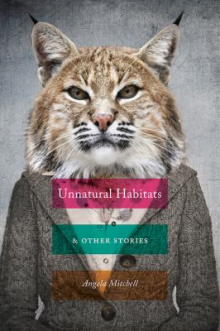
There is a scene in Unnatural Habitats & Other Stories where a bobcat lounges on a bed between a man and a woman. It’s the couple’s first night together. The man loves animals and keeps them in his house, including birds and snakes, but the bobcat is special. Soon, awkwardness enters the scene, the moment the woman wakes up after her nap and feels the bobcat’s belly moving up and down beside her, instead of her date. She has awakened the bobcat now, looking at her like an unwanted third-party on the man’s bed, a rival. The woman feels strange about the situation, a strangeness intensified by the remoteness of the place she’s in: “She was somewhere she’d never been before, miles, probably, from the nearest highway, deep in the Arkansas woods.”
Most of Angela Mitchell’s characters in this debut collection are caught in that predicament. There are more than moments of strangeness and indecision. There are chasms of alienation. At times they feel like the black and white photographs of Matthew Genitempo in Jasper, a book that was reviewed in The New Yorker. His photographs capture the Ozarks with stunning melancholy and solitude, a desolate state of exile, detached from a universe driven to wire everyone into new levels of interconnectedness. While Genitempo’s project breathes images of clutter, dilapidation, and folks who appear to shun the concept of proper hygiene, the Ozarks of Mitchell refuse to romanticize poverty, and set her stories in the imagination of self-determination driven by ambition, struggling to ride the train of upward mobility. It’s a world bristling with schemers who walk the existential line between pride, self-preservation, and the specter of criminal behavior.
Consider the nameless female narrator in “Not From Here,” whose father is plagued with unstable employment, and a girlfriend who “comes and goes as she wants.” This could be a story of a girl whose future is highly dependent on government social services. She envies the life of Annette Clark, a schoolmate who resides in a big house. She longs for Annette’s white cat, velvet couch, and other fancy things. Mitchell tells the story so well that we forget the extent on which pedophilia drives the plot. The adult, female narrator in “This Trailer is Free” doesn’t feel any moral compunction after robbing a bank. Her childhood is a result of bad decisions that hampered her father’s employment prospects. On the other hand, keeping her head straight in high school lands her a decent job after graduation, before signing up for the Army. Then, her love for a man, while in the military, planted the seed for future, failed relationships.
In the end though, Mitchell’s women never alienate their conscience. They have no one to blame for their misfortunes but themselves. But can we say the same with Mitchell’s men? Mitchell puts their testosterone levels on overdrive, especially in two stories that appear to be chapters of a novel-in-progress: “Retreat” and “Unnatural Habitats.” Here, the men in question are Gary and Layton. Layton manages an insurance business called Insure-U, and Gary works for him as an insurance adjuster. But technically, Layton’s father holds the title of the business, since he bought it for his son’s future, “hopeful it would provide the structure his wayward son needed.” Sadly though, Insure-U is only a cover for another business with bigger turnovers: drugs. One day, Layton waits for a customer in a parking lot, when three men with baseball bats drag him out of his car. Now, why would Layton think Gary is behind the attack? I invite you to find out.
Stop binge-watching Ozark on Netflix, for a while. I know you’re entranced by Laura Linney’s irreproachable but chilling character on that show. However, you’ll be glad you took a detour into the Ozarks of Angela Mitchell, where the pages might feel like a bobcat’s fur now and then. And avoid tapping the aquarium housed in the woods of Arkansas, because something lethal fizzles the air when you irritate the snakes.